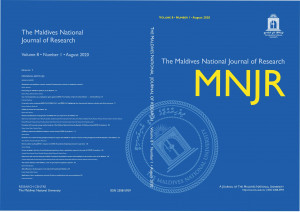Social Acceptance and Social, Economic, and Environmental Impact of Renewable Energy - A Case Study from Hanimaadhoo Island, Maldives
DOI:
https://doi.org/10.62338/9knn7e29Keywords:
Social Acceptance, Renewable Energy, Social, Economic and Environmental Impacts, Cultural Theory, MaldivesAbstract
Social acceptance particularly public opposition on renewable energy have
been key obstacles for renewable energy deployment in many developed nations particularly
in Europe. The level of awareness of the situation in the global south, particularly in Small
Island Developing States (SIDS), was rather limited. This research utilizes Cultural
Theory as a framework, incorporating data obtained from household questionnaire
surveys, focus group discussion and individual interviews conducted on Hanimaadhoo
island in the Maldives. The objective is to gain a more comprehensive understanding of
how individuals’ worldviews influence their opinions and behaviors regarding renewable
energy. This study also aims to comprehend the anticipated social, economic, and
environmental impacts of renewable energy. The authors highlight key findings from a
local perspective that they deem crucial to consider for the future deployment and diffusion
of renewable energy in the Maldives
References
Akella, A. K., Saini, R. P., & Sharma, M. P. (2009). Social, economical and
environmental impacts of renewable energy systems. Renewable Energy, 34(2),
-396. https://doi.org/10.1016/j.renene.2008.05.002.
Batel, S. (2020). Research on the social acceptance of renewable energy
technologies: Past, present and future. Energy Research & Social Science, 68.
https://doi.org/10.1016/j.erss.2020.101544.
Bellamy, R., & Hulme, M. (2011). Beyond the Tipping Point: Understanding
Perceptions of Abrupt Climate Change and Their Implications. Weather,
Climate, and Society, 3(1), 48-60. https://doi.org/10.1175/2011wcas1081.1.
Bertheau, P. (2020). Assessing the impact of renewable energy on local development
and the Sustainable Development Goals: Insights from a small Philippine island.
Technological Forecasting and Social Change, 153. https://doi.org/10.1016/j.
techfore.2020.119919.
Claire Marris, I. H. L. a. T. O. R. (1998). A Quantitative Test of the Cultural Theory
of Risk Perceptions: Comparison with the Psychometric Paradigm.
Dake, K. (1991). Orienting Dispositions in the Perception of Risk An Analysis of
Contemporary Worldviews and Cultural Biases.
Delrio, P., & Burguillo, M. (2008). Assessing the impact of renewable energy
deployment on local sustainability: Towards a theoretical framework. Renewable
and Sustainable Energy Reviews, 12(5), 1325-1344. https://doi.org/10.1016/j.
rser.2007.03.004.
Douglas, M. (1978). Cultural Bias: Humanities Press.
Ian H. Langford, S. G., Ian J. Bateman, Rosemary J. Day, and R. Kerry Turner.
(2000). Public Perceptions of Health Risks from Polluted Coastal Bathing
Waters: A Mixed Methodological Analysis Using Cultural Theory.
Jaramillo-Nieves, L., Del Río, P. (2010). Contribution of Renewable Energy
Sources to the Sustainable Development of Islands: An Overview of the
Literature and a Research Agenda. Sustainability, 2(3), 783-811. https://doi.
org/10.3390/su2030783.
Knoll, E.-M. (2018). The Maldives as an Indian Ocean Crossroads. In
Oxford Research Encyclopedia of Asian History. https://doi.org/10.1093/
acrefore/9780190277727.013.327
Kumar, M. (2020). Social, Economic, and Environmental Impacts of Renewable
Energy Resources.
Marco Verweij, M. D., Richard Ellis, Christoph Engel, Frank Hendriks, Susanne
Lohmann, Steven Ney, Steve Rayner and Michael Thompson. (2006). Clumsy
Solutions for a Complex World: The Case of Climate Change.
Marris, C., Langford, I.H. and Riordan, T.O. (1996). Integrating sociological and
psychological approaches to public perceptions of environmental risks: detailed
results from a questionnaire survey.
Ministry of Environment. (2020). Maldives Nationally Determined Contribution.
Oppenheimer, M., B.C. Glavovic , J. Hinkel, R. van de Wal, A.K. Magnan, A. AbdElgawad, R. Cai, M. Cifuentes-Jara, R.M. DeConto, T. Ghosh, J. Hay, F. Isla,
B. Marzeion, B. Meyssignac, and Z. Sebesvari. (2019). Sea Level Rise and
Implications for Low-Lying Islands, Coasts and Communities.
Rayner, M. T. a. S. (1998). Risk and Governance Part I: The Discourses of Climate
Change.
Sheikh, N. J., Kocaoglu, D. F., & Lutzenhiser, L. (2016). Social and political
impacts of renewable energy: Literature review. Technological Forecasting and
Social Change, 108, 102-110. https://doi.org/10.1016/j.techfore.2016.04.022.
Thompson, M., & Wildavsky, E.R. (1990). Cultural Theory. Boulder, CO: Westview
Press.
West, J., Bailey, I., & Winter, M. (2010). Renewable energy policy and public
perceptions of renewable energy: A cultural theory approach. Energy Policy,
(10), 5739-5748. https://doi.org/10.1016/j.enpol.2010.05.024



